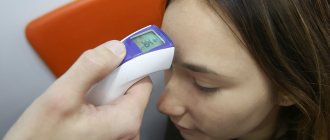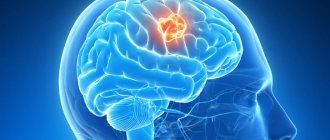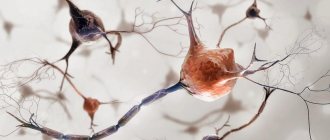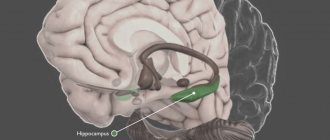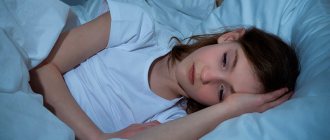We can talk for a long time about the fact that snoring is supposedly predominantly a male problem. But the fact remains that after 45-50 years, many representatives of the fair sex make an unpleasant discovery for themselves - even a true lady is not immune from snoring. And the matter here is not limited to extra pounds or a stuffy nose due to a cold. The main cause of this acoustic phenomenon may be menopause.
With the onset of menopause, many complain of problems with sleep. In addition to snoring, there are difficulties falling asleep and waking up too early. In addition, a night's rest is not refreshing; a woman feels lethargic, even if she has slept long enough. Insomnia is a common side effect of hormonal changes in the body. However, a feeling of chronic fatigue, coupled with daytime sleepiness and distracted attention, may indicate the development of obstructive sleep apnea syndrome (OSA).
Sleep problems and other signs of menopause
Quite often, women aged “45 plus” turn to doctors with a request to prescribe them pills for insomnia during menopause. Experts clarify: it is incorrect to talk only about insomnia. The hormonal changes that occur in the female body during this period provoke a fairly wide range of problems. These include difficulties falling asleep, frequent awakenings, getting up early for no reason, and nightmares...
Hormonal changes that occur in the female body during menopause provoke not only insomnia, but also other sleep disorders: difficulty falling asleep, frequent awakenings, getting up early for no reason, nightmares
Treatment of menopausal syndrome
The menopause is a physiological process in the life of every woman. It is characterized by the decline of reproductive function due to naturally occurring hormonal changes in the body. As a rule, it is observed from 45 to 55 years and its main external manifestation is the gradual cessation of menstruation. But fluctuations in one direction or another are possible: a decrease in the period of menopause (menstruation stops almost immediately, without specific menopausal symptoms), its earlier or later onset.
Menopause can occur without or with mild vegetative-vascular disorders, without disturbing the usual way of life, but it can also be of a pronounced pathological nature, then it is called climacteric, or menopausal syndrome, which reduces a woman’s performance, significantly affecting her general well-being and vital functions.
Reasons for development
During menopause, in a woman’s body, under the influence of gradually or abruptly advancing age-related hormonal changes, a multifunctional change in the functioning of organs and systems occurs, starting mainly with the endocrine glands (primarily the ovaries and the hypothalamic-pituitary system). In this case, there is a slowdown and complete cessation of maturation of follicles in the ovaries, which decrease in volume over time, being replaced by connective tissue. This is accompanied by a decrease in estrogen levels, but the production of follicle-stimulating hormone in the pituitary gland can increase at this time by 10-14 times, and luteinizing hormone by 3-4 times, followed by a gradual decrease. And since estrogens affect the function of many body systems (breast glands, bladder, pelvic floor muscles, central nervous system, blood vessels, skin, mucous membranes, bones), their deficiency affects not only the functioning, but also the structure of organs, manifesting the development of vegetative-vascular, psychoneurological, urogenital pathologies, cardiovascular diseases (arterial hypertension, atherosclerosis, coronary artery disease, obesity, type 2 diabetes), the appearance of osteoporosis, aging of the skin, increased risk of autoimmune diseases.
The most common menopausal disorders
The classification by type is based on the principles of time periodization. In this connection, the following climacteric disorders are distinguished:
- Early-time - developing from the premenopausal period and ending within 1-2 years of postmenopause: asthenoneurotic, vegetative-vascular, psycho-emotional disorders;
- Medium-term – usually appearing 2-4 years after the onset of menopause: urogenital pathologies, deterioration of the skin, hair and mucous membranes, for which symptomatic treatment is no longer effective.
- Late-time – occurring 5-8 or more years after the onset of menopause: metabolic diseases (atherosclerosis, osteoporosis), cardiovascular diseases, Alzheimer’s disease and others.
The main manifestations of menopausal syndrome
In many ways, the development of menopause and its symptoms are determined by the general health of the woman at the time of its onset, the state of her hormonal levels, living conditions, and heredity.
Vegetovascular or vasomotor disorders occur in 80% of women, but their severity varies. Often they are in the nature of so-called “hot flashes”, manifested by a temporary feeling of heat, increased sweating and redness of the skin of the face, neck-collar area, décolleté, head, palpitations, slight dizziness, and sometimes an increase (or fall) in blood pressure. The duration of hot flashes usually does not exceed a few minutes, but their frequency is very variable (from 2-5 per day to 20 or more, including at night).
Asthenoneurotic and psychoemotional - diagnosed in 13-20% of women. They manifest themselves in the form of sleep disturbances, high fatigue, a decrease in the psycho-emotional background, up to the onset of depression, and occasionally phobias and increased irritability. It is also possible that absent-mindedness, decreased attention, and forgetfulness may occur, leading to decreased ability to work.
Urogenital - occur more often with increasing age, can manifest as dryness and atrophy of the vaginal mucosa, burning, itching, dysuria (frequent urination or urinary incontinence), decreased libido, pain during sexual intercourse, etc.
Metabolic – found in 50% of women, and their number increases with age. Most often, this leads to obesity, the development of osteoporosis, skin aging, brittle nails, thinning and hair loss.
Sympathoadrenal crises are atypical manifestations of menopausal disorders. They occur in the form of increased blood pressure, headache, temporary fluid retention in the body (edema) followed by attacks of polyuria, pain in the heart (but there are no signs of ischemia on the ECG).
Immunological disorders also belong to the atypical form. They are expressed in the form of a general decrease in immunity, high susceptibility to seasonal respiratory diseases, disruptions of the allergic status (the occurrence of increased sensitivity and intolerance to certain foods, medications, household chemicals, cosmetics), and the development of autoimmune pathologies.
Diagnosis of menopausal disorders
Usually it does not present any difficulties due to the specific symptoms; however, all women during this period are recommended to consult not only their gynecologist, but also an endocrinologist, therapist, neurologist, cardiologist and other specialists (as indicated). In addition, it is recommended to conduct an ultrasound of the pelvic organs, mammary glands, thyroid gland, ECG, and study the level of hormones - follicle-stimulating hormone, anti-Mullerian hormone, estrogens, TSH in the blood.
Basic principles of therapy
In case of early menopause and initial manifestations of menopausal syndrome, menopausal hormonal therapy is prescribed individually. The forms of administration of MG drugs, course, daily doses are selected by the doctor individually, its goal is not only to remove symptoms, but also to prevent possible long-term consequences (urogenital disorders, cardiovascular diseases, osteoporosis, etc.).
Estrogens no longer protect during menopause
When menopause occurs, the level of the main female sex hormone, estrogen, sharply decreases. This is the most important cause of insomnia and other sleep problems. The fact is that estrogens protect sound sleep. If hormones are produced in sufficient quantities, then our brain can “ignore” unimportant external stimuli for the sake of proper rest.
During menopause, estrogen protection disappears and the brain overreacts to any, even the most insignificant, noise. Low estrogen levels cause us to flinch at every sound outside and wake up when our neighbors come home late.
Due to low estrogen levels during menopause, our brain overreacts to any noise, no matter how small.
Menopause symptoms
Tides
Hot flashes are a sudden feeling of heat in the face, neck, chest and arms, which is accompanied by fever, sweating and a feeling of shortness of breath.
The skin may become red or covered with red spots. Often this may be accompanied by dizziness, nausea and tachycardia (rapid heartbeat). Tides are usually short-lived. Lasts from 30 seconds to 2-3 minutes.
Nocturnal hyperhidrosis
Severe night sweats are, in principle, considered one of the manifestations of hot flashes that occur during sleep. Again, the problem is a deficiency of female sex hormones, which have a direct effect on the thermoregulation center located in the hypothalamus. This part of the brain receives false signals that the body is overheated. As a result, mechanisms for releasing excess heat are activated and sweating occurs. It should be noted that hyperhidrosis during sleep can be a symptom not only of menopause, but also of certain diseases.
Irregular menstruation
The gradual decline of the hormonal function of the ovaries leads to menstruation becoming shorter, irregular and scanty. The interval between menstruation increases and can range from 40 to 90 days, or even more. This period is called perimenopause. Over time, periods stop. If they do not make themselves felt for at least a year, it means menopause has arrived.
Vaginal dryness
With age, metabolic processes in our body slow down, elasticity and tissue moisture decrease, and intimate areas are most sensitive to these changes. The walls of the vagina become flabby, cracks form in them, and there is a tendency to prolapse and prolapse of the pelvic organs. One of the symptoms of these changes is the sensation of a foreign body in the vagina. With age, all these troubles only increase. Before 45 years of age, only 15-30% of women know them, and after 50 years of age - already 40%.
Insomnia
Sleep problems during menopause are quite common. The same female sex hormones are to blame for this. Lack of estrogen, which causes hot flashes and night sweats (which interferes with restful sleep), is also accompanied by impaired absorption and metabolism of magnesium, a mineral that is responsible for muscle relaxation. And the lack of another hormone - progesterone - leads to insomnia. After all, progesterone is a natural relaxant; it calms, pacifies and improves sleep.
Mood swings
Changes in hormonal levels lead to disruption of the psycho-emotional state. Menopause symptoms such as tearfulness, anxiety, restlessness, irritability, and even aggressiveness appear.
Decreased sexual desire
According to statistics, about 80% of women between the ages of 50 and 60 remain sexually active. However, it should be noted that decreased sexual desire is one of the common symptoms of menopause. There are both physiological and psychological reasons for this. A symptom of menopause such as vaginal dryness has already been mentioned.
Brittle nails, thinning hair
Like most menopause symptoms, hair loss is caused by hormonal imbalances in the body. This is a fairly common problem that affects 50-75% of menopausal women. But not only hair suffers from a lack of estrogen. During this difficult period for the female body, nails can peel, become brittle and dry.
Heart problems
A natural decrease in the level of the female hormone estrogen can cause cardiovascular disease among menopausal women. The fact is that estrogen has a positive effect on the walls of blood vessels, helping to maintain flexibility and elasticity, which ensures free blood flow through the arteries.
Osteoporosis
One of the most dangerous symptoms of menopause. After menopause, overall bone mass decreases and bone tissue becomes porous. This leads to a risk of fractures, especially in the wrists, hips and spine.
Urinary incontinence
Bladder dysfunction is a fairly common symptom of menopause. A deficiency of female sex hormones can lead to weakening of the pelvic muscles responsible for bladder control, leading to unpleasant consequences such as urinary incontinence.
Weight gain
An increase in body weight often accompanies the approach of menopause. However, extra pounds are not always a direct symptom of menopause. Various factors play a role. For example, incorrect eating habits and love for fatty, high-calorie foods.
Muscle pain and headaches
A very common symptom of menopause is headache. It can be the result of changes in the tone of blood vessels (vasomotor disturbances), as well as weakness due to hot flashes, insomnia and stress. Another unpleasant symptom of menopause is muscle tension caused by impaired calcium metabolism in the body.
Memory problems
Mature women often complain of memory lapses and inability to concentrate. This is a fairly common symptom of menopause and is also associated with decreased estrogen levels. According to statistics, two thirds of menopausal women suffer from such “whims” of memory. All problems disappear as soon as hormonal fluctuations smooth out.
Allergy
It has been proven that women of menopausal age are especially susceptible to the development of allergic reactions and are more likely than others to experience exacerbation of existing allergies. The endocrine and immune systems are closely related, and the immune system can respond to hormonal changes with the appearance of new allergic reactions (most often, allergic rhinitis, asthma and dermatitis).
You can find out about the onset of menopause using a blood test.
- Blood test for follicle-stimulating hormone (FSH) . This hormone is produced by the pituitary gland and is responsible for the production of female sex hormones. With the onset of menopause, FSH continues to be released, but the ovaries no longer respond by producing estrogen in response. So an increase in FSH levels indicates menopause.
- Blood test for estradiol , which is the main estrogen during reproductive age. Accordingly, the cessation of ovarian function, which is characteristic of menopause, leads to a decrease in the level of estrogen in the blood.
- Blood test for luteinizing hormone (LH) . This hormone stimulates the final maturation of the follicle, its rupture and ovulation. During menopause, the level of luteinizing hormone in the blood is elevated.
If hot flashes, dizziness, emotional instability and other signs of menopause significantly reduce the quality of life and interfere with usual activities, the woman should consult a doctor. A gynecologist-endocrinologist will assess her condition and select hormone replacement therapy taking into account the characteristics of the body.
Manifestations of menopause: low progesterone
As is known, in menstruating women estrogen is synthesized in the first phase of the cycle, and progesterone in the second. This is another important female hormone that also affects the quality of sleep. Progesterone has a calming effect on the nervous system. But since female hormones during menopause are not produced in sufficient quantities, the lack of progesterone immediately affects our nerves.
It is because of progesterone deficiency that the brain is in constant arousal and does not allow sleep. Low progesterone “forces” us to “hold work meetings” all night long and endlessly scroll through the same thoughts in our heads. Due to the lack of the hormone, instead of a restful sleep, a wave of anxiety comes over us, we are thrown into the heat, then into the cold and have nightmares.
Why do melatonin levels decrease with age?
The human body is an ingenious system with the finest settings. This is especially true for the neuroendocrine system - some aspects of its regulation still cause controversy among scientists. However, many details of hormonal relationships are already quite well studied. For example, if ten years ago melatonin was considered an unimportant neurohormone, today, according to doctors, it is one of the main adaptogens, working at all levels of the neuroendocrine system. Its effects are varied, but in general they can be characterized as synchronizing and adapting.
The natural process of ovarian decline and, consequently, a decrease in the level of the hormone estradiol reduces the synthesis of melatonin. Research results show that melatonin in women at the age of menopause decreases by 1.5-2 times compared to the norm.
The situation is aggravated if a woman sleeps with the night light on or the curtains poorly drawn - the light blocks the production of melatonin. The habit of browsing social networks or reading from mobile devices before going to bed also worsens the quality of sleep - it is the blue (with a wavelength of 450-480 nanometers) glow from electronic devices that is one of the factors that suppresses the synthesis of melatonin.
Chronic insomnia, or insomnia, negatively affects not only the nervous system. The already increased risks of coronary heart disease and diseases of the genitourinary system during menopause increase. In addition, as the results of recent studies have shown, in women with sleep disorders it may increase because... called oncological potential, because Melatonin is a powerful antioxidant and “conductor” of the proper functioning of all cells in the body. To protect your health and prevent the development of serious diseases, at the first signs of age-related insomnia, experts recommend undergoing a specialized examination as soon as possible and normalizing your sleep.
Good night! How to sleep correctly Read more
Menopause and melatonin deficiency
After menopause, the body's ability to synthesize melatonin, a hormone that allows us to sleep soundly and fall asleep quickly, decreases. Another problem that arises during menopause is that it becomes more difficult to fall asleep. By the way, melatonin is called not only the sleep hormone, but also the hormone of youth, because it slows down the aging process and promotes cell restoration during sleep.
It is known that it is produced only in the dark, and any light sources block this process. That is why one of the important medical recommendations on how to behave during menopause is maintaining sleep hygiene. In the scientific world, such a concept as “light pollution” even appeared. It is becoming more and more difficult for a modern person to create a “dark corner” for a comfortable rest: lanterns are shining through the windows, the phone and tablet on charge are blinking, someone in the household is watching TV... All this interferes with the synthesis of melatonin. But a woman’s health after 45 years depends greatly on her proper rest. Sleep disorders prevent the body and brain from recovering properly overnight, making us an easy target for age-related diseases.
Never go to bed with the night light on or the curtains open, much less with the TV on. If this is not possible, use a special sleep mask.
The expert's advice is as follows: everything possible must be done to help the body replenish its melatonin reserves.
- Get into the habit of going to bed early. The sleep hormone is produced from midnight to four in the morning. At this time, sound and deep sleep is important.
- Eliminate all light sources. If light hits the retina, melatonin synthesis stops. Therefore, never go to bed with the night light on or the curtains open, much less with the TV on. When this is impossible, use a special sleep mask.
- After seven in the evening you need to prepare your body for bed. Therefore, it is better to turn off or dim the bright overhead lighting. But the soft light of a floor lamp or table lamp, on the contrary, has a calming effect.
- If you need to work in the evening, then it is better to use directional light and under no circumstances arrange a “white day” throughout the apartment.
Menopause symptoms: restless legs syndrome
Poor sleep can be caused by restless legs. Such symptoms of menopause are often found in women after 50. Patients complain that they cannot sleep due to unpleasant sensations in the lower extremities (tingling, burning, goosebumps) and an obsessive desire to move their legs (stand up and stretch, because it becomes easier when moving) .
Why is this happening? Modern medicine believes that one of the decisive factors is hormonal imbalance. During menopause in women, the level of sex hormones in the blood sharply decreases, which in turn reduces the sensitivity of cells to hormones, in particular to the hormone and neurotransmitter dopamine. Dopamine is involved in the regulation of muscle tone and coordination of the work of different muscles. If the cells “do not perceive it, then symptoms such as persistent tension and the inability to relax occur. Treatment in this case should be comprehensive and require the cooperation of a gynecologist, endocrinologist and neurologist.
Vasovegetative manifestations of menopausal syndrome
As a rule, insomnia is accompanied by other symptoms of menopause. At night, women experience a whole range of symptoms of so-called vasovegetative disorders: hot flashes and bouts of sweating, strong heartbeats and paresthesia (numbness or tingling sensations in various parts of the body). It is clear that sleeping pills are bad helpers in this situation. They will not be able to “remove” all these unpleasant signs of menopause that interfere with proper rest. What recommendations do doctors give us?
The first step in the fight against insomnia and other sleep disorders should be to eliminate the cause - hormonal imbalance. Hormone replacement therapy has proven itself in the treatment of such problems in menopause
Menopausal syndrome, symptoms
During menopause, a woman may experience a number of unpleasant sensations. Symptoms can vary in intensity and be present in different combinations. They are divided into several groups.
Neurovegetative symptoms:
- tides;
- sweating;
- changes in blood pressure;
- chilling;
- nausea, abdominal pain;
- dizziness, headaches;
- heartache;
- palpitations.
Metabolic-endocrine symptoms:
- swelling, weight gain;
- engorgement of the mammary glands, mastopathy;
- flatulence;
- vaginal dryness, spotting, bleeding;
- skin atrophy, itching;
- urinary incontinence, painful urination;
- pain in bones and joints;
- increased blood cholesterol levels.
Psycho-emotional symptoms:
- irritability;
- decreased libido;
- sudden mood changes;
- tearfulness;
- aggressiveness;
- anxiety;
- depression, apathy;
- forgetfulness, deterioration of concentration;
- insomnia;
- inexplicable sensations (tingling, goosebumps, etc.).
Sleep disturbance during menopause: what to do
Take female hormones in tablets
During menopause, even the smallest sleep disorders threaten us with big troubles and significantly worsen the quality of life. Therefore, the first step in the fight against insomnia and other sleep disorders should be to eliminate the cause - hormonal imbalance. Hormone replacement therapy has proven itself in the treatment of such problems during menopause. However, even the most proven medications cannot be taken without a doctor’s prescription. A consultation with an experienced gynecologist-endocrinologist, which you can get directly on our website, will help you understand this issue in more detail.
Practice sleep discipline like Audrey Hepburn
“Sleep rules” sound like truisms, but nevertheless they must be followed. A good example of organizing sleep and wakefulness was demonstrated by Audrey Hepburn. The biography of the actress contains memories of her loved ones that she went to bed early and got up with the first rays of the sun.
Important: you need to go to bed and wake up at the same time; You cannot break this mode even on weekends or during vacation.
“I love being outside, I love long walks with my dogs and I love looking at trees, flowers and the sky,” the actress said.
Important: be physically active during the day, but three hours before bedtime you must complete all strenuous activities. Leisurely walks before bedtime and meditation are useful.
The bed should only be used for sleeping and sex
Psychotherapist Andrei Kurpatov in his book “The Cure for Insomnia” writes that for quality sleep it is necessary to build “the right associative connections.” Namely, use the bed only for sleep and sex. The body “remembers” that in bed we read books, work on the computer, watch TV, even have serious conversations, but do not sleep.
Medicine has long known the beneficial effects of sleep. While we sleep, the body produces special substances that calm, relieve stress and anxiety. It is no coincidence that our ancestors said: “the morning is wiser than the evening.” Agree, in the morning light, worries and fears no longer seem too threatening


